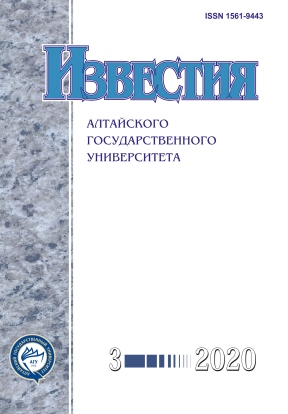Family Values of Siberian Merchants
УДК 94(571.1).08 ББК 63.3(253.3)53-282.4
Abstract
The article discusses with topical issues of social history of Russia in the second half of the 19th — early 20th centuries on the example of one class. Active modernization processes in Russia changed not only the foundations of economic development, but also the collective consciousness. The "catch-up" type of modernization is usually associated with the peculiarities of the Russian economy and the dominance of state interests. Without denying this position, it should be noted that if there is no change in the views of the population, the formation of new values, we should not expect positive and effective results. The Russian merchant class accumulated significant economic resources in its hands, but it was extremely slow to enter into new processes, which, from our point of view, is primarily due to social conservatism. This is most evident in the maximum protection from external influences of family values. However, it should be noted that under the influence of time, in the beginning of 20th century there has been a change. Intra-family relations most clearly reflected in a concentrated form the origin and status of each member of the family, and the attitude to the emerging changes. Through the memories of representatives of these families, the heterogeneity of the social appearance of representatives of the class will be shown. Conservatism in the family did not mean denying progress at all, it was a desire to maintain reliable "rear". As history shows, stable developing societies protect and cultivate family values.
Downloads
Metrics
References
Бердяев Н.А. Истоки и смысл русского коммунизма. М., 1990.
Булгаков С.Н. Философия хозяйства : в 2 т. М., 1993.
Калашников И. Дочь купца Жолобова. М., 1888.
Мельников П.И. (Андрей Печерский). В лесах : в 2 т. М., 1984.
Мельников П.И. (Андрей Печерский). На горах : в 2 т. Иваново, 1993.
Островский А.Н. Полное собрание сочинений : в 12 т. М., 1979.
Боханов А.Н. Коллекционеры и меценаты в России. М., 1989.
Миронов Б.Н. Социальная история России периода империи (XVIII — начала XX в.). Генезис личности, демократической семьи, гражданского общества и правового государства : в 2 т. СПб., 1999.
Брянцев М.В. Культура русского купечества (воспитание и образование). Брянск, 1999.
Бойко В.П. Социально-психологические особенности сибирской буржуазии второй половины XIX века (по мемуарным источникам) // Вопросы истории дореволюционной Сибири. Томск, 1983.
Бойко В.П. Сибирская периодическая печать как источник по изучению крупной буржуазии Западной Сибири второй половины XIX в. // Вопросы историографии и источниковедения Сибири периода капитализма : сб. ст. Томск, 1985.
Бойко В.П. История изучения сибирского купечества на современном этапе // Сибирское купечество: истоки, деятельность, наследие : материалы Первой Всерос. науч. конф. Томск, 2014.
Скубневский В.А., Старцев А.В., Гончаров Ю.М. Купечество Алтая второй половины XIX — начала XX вв. Барнаул, 2001.
Резун Д.Я. Родословные сибирских фамилий: история Сибири в биографиях и родословных. Новосибирск, 1993.
Гончаров Ю.М. Городская семья Сибири второй половины XIX — начала XX вв. Барнаул, 2002.
Жиров А.А. Провинциальное купечество Сибири (на материалах тарского купечества XVIII — начала XX вв.) : автореф. дис. ... канд. ист. наук. Барнаул, 2000.
Задорожная О.А. Купечество Западной Сибири (конец XVIII — первая четверть XIX вв) : автореф. дис. ... канд. ист. наук. Казань, 1995.
Мазалова М.А. Эволюция элитности в семейном воспитании купечества в XIX веке // Вестник Томского гос. пед. ун-та. 2012. №5 (120).
Лобачева И.Н. Семья и частная жизнь купечества Тульской губернии второй половины XIX — начала XX в. : автореф. дис. ... канд. ист. наук. Тула, 2017.
Алтайский государственный краеведческий музей ОФ. 17816. НВФ. 6617/1 Фонд Федуловых.
Скубневский В.А. Купцы Федуловы в воспоминаниях потомков и по историческим источникам // Краеведческие записки. Вып. 5. Барнаул, 2003.
Государственный архив Томской области Ф. Р-1878. Фонд Малых Марии Александровны, Сергея Александровича, Валентины Сергеевны. Оп. 1. Д. 17.
Тамм Л.И. Записки иркутянки. Иркутск, 2001.
Каменский краеведческий музей. ОФ. 8901/1 — 24. Коллекция писем Кудрявцевой А.Вс.
Будни и праздники горного округа. Из фонда Е. П. Клевакина // Судьбы: Воспоминания, дневники, письма, стихи, путевые заметки, протоколы допросов. Барнаул, 1996.
Черкасов А. Записки барнаульского городского головы // Алтай. 1993. № 1-6.
Черепанов С. Отрывки из воспоминаний сибирского казака // Древняя и новая Россия. 1876. Т. 2, № 6-8.
Кулаев И.В. Под счастливой звездой. Воспоминания. М., 1999.
Старцев А.В. Е.П. Клевакин. Очерки из бийской жизни // Культурное наследие Сибири. Барнаул, 1994.
Izvestiya of Altai State University is a golden publisher, as we allow self-archiving, but most importantly we are fully transparent about your rights.
Authors may present and discuss their findings ahead of publication: at biological or scientific conferences, on preprint servers, in public databases, and in blogs, wikis, tweets, and other informal communication channels.
Izvestiya of Altai State University allows authors to deposit manuscripts (currently under review or those for intended submission to Izvestiya of Altai State University) in non-commercial, pre-print servers such as ArXiv.
Authors who publish with this journal agree to the following terms:
- Authors retain copyright and grant the journal right of first publication with the work simultaneously licensed under a Creative Commons Attribution License (CC BY 4.0) that allows others to share the work with an acknowledgement of the work's authorship and initial publication in this journal.
- Authors are able to enter into separate, additional contractual arrangements for the non-exclusive distribution of the journal's published version of the work (e.g., post it to an institutional repository or publish it in a book), with an acknowledgement of its initial publication in this journal.
- Authors are permitted and encouraged to post their work online (e.g., in institutional repositories or on their website) prior to and during the submission process, as it can lead to productive exchanges, as well as earlier and greater citation of published work (See The Effect of Open Access).








